by Nivi Jaswal, MVLCE, with Julie Wayne and Madhavi Kolte
posted March 9, 2021
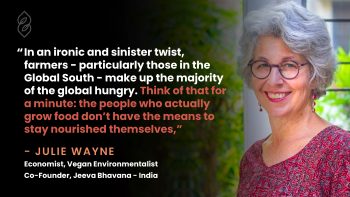
China, India, the United States, and Brazil are the world’s largest food producers. While the United States is noted for high productivity and efficiency (factory farms), India ranks lowest in productivity, despite 600 million farmers (small holders), equal to twice the total population of the United States.
Julie Wayne was a carnist environmental activist before being deeply influenced by Dr. Tuttle’s World Peace Diet. She and Madhavi Kolte co-founded Jeeva Bhava, a farmer-transition NGO in India. Madhavi gave up meat when she saw a lamb slaughtered, but still consumed dairy to avoid social conflict. She went vegan once connecting the dots between food, food systems, and farmer oppression.
Fantasy of the Family Farm
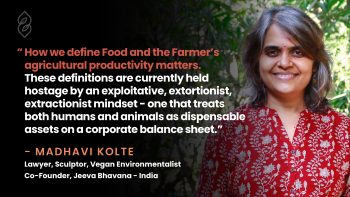
In the national imagination, the American family farm still exists as it does on holiday greeting cards. But this has been declining for generations due to a trade war, severe weather due to climate change, tanking commodity prices related to globalization, political polarization, and corporate farming. Farms are no longer defined by a silo and a red barn, but by technology and efficiencies of scale. It is one of the worst crises in decades. Farm bankruptcies increased 12% in the Midwest and 50% in the Northwest in 2019. Thousands have simply stopped farming, knowing that bankruptcy reorganization would not save them. More than 100,000 farms were lost between 2011 and 2018, and farmer suicides peaked.
The Green Revolution: A Failed Experiment
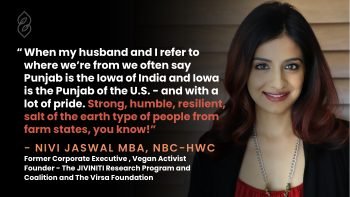
Nivi Jaswal, whose nonprofit focuses on marginalized women, says her pride in the Green Revolution was challenged when she read Rethinking Food and Agriculture by Dr. Laila Kassam and Dr. Amir Kassam.
Punjab, one of Earth’s most fertile regions, called India’s Food Basket, is also the most mechanized farm state in India. Its farmers have the highest rate of suicide in the country. Ongoing climate crises have resulted in increased crop fires and decreased rainfall. The global pandemic and new proposed agricultural laws created massive discontent with Punjab’s farmers, who are protesting.
Why Are India’s Farmers Protesting?
As Jeeva Bhavana’s Position Statement explains, these protests are in response to farm bills passed by the Indian Parliament September 2020. These bills allow farmers to sell directly to the private sector versus government-regulated farmers’ markets, allow private sector contracts with farmers, and remove all private sector regulations. The government claims these laws will liberate farmers, letting them negotiate the right price with the open market.
International Agencies and Corporations: Purpose or Profit?
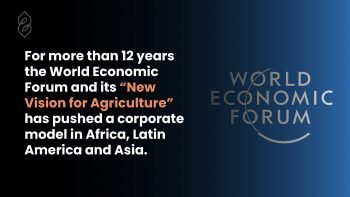
India is the big target, where resistance to corporate takeover of agriculture has been fierce since the failed Green Revolution of the 1960s. The United Nations, per its 2030 Sustainable Agriculture Goals, is holding a Food Systems Summit September 2021, aiming to reshape world agriculture and food production. Recent radical farm laws from India’s Prime Minister Modi are part of the same global agenda.
How the Cult of Colossal Imperiled American Agriculture
The U.S. has approximately 250,000 factory farms, with roots going back to the 1930s with mechanization of pig slaughterhouses and chickens packed into huge sheds in appalling conditions. In the 1970s, USDA Secretary Butz pushed the idea of large-scale farming with the mantra “get big or get out” (a tune similar in India). American farmers invested heavily in land, machinery, and agrochemicals, incurring huge debt. A decade later, crisis hit as a grain embargo, overproduction and high interest rates dramatically drove up costs (watch Growing Doubt, a Greenpeace film for more details).
Solutions on the Horizon:
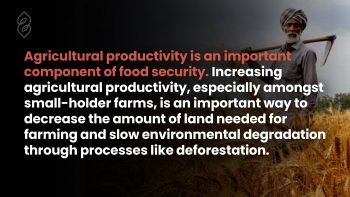
- Since agriculture has such impacts on climate change, Project Drawdown presents Sustainable Intensification for Smallholders as an important method for Climate change mitigation.
- Alternate production paradigms, such as Conservation Agriculture (CA), have been proposed to support sustainable production to meet future food and agricultural needs (Kassam et al., 2009, 2013). CA’s ability to reduce production inputs and increase outputs, getting “more for less,” thus providing a truly pro-poor solution for poor farmers. Unlike the current paradigm, this is most certainly an issue of ethics, as is the ability of CA to protect and sustain the natural resource base in agricultural ecosystems and stop and reverse land degradation, regenerate agroecosystem functions, and sustainably deliver societal services for all communities.
- 50by40 aims to make a Just Transition in animal agriculture a key focus in the global shift towards more resilient, equitable, and sustainable food systems.
- Within the JIVINITI Coalition, Jeeva Bhavana is busy with Urvarasa, an initiative transitioning India’s dairy farmers to veganic agriculture focused on fair-trade, sustainably grown, and cruelty-free healthy food and conscious consumption.

A connector at heart, Nivi Jaswal builds strong and passionate teams inspired to deliver socially responsible projects with high community impact. She brings experience in marketing and strategy in the consumer goods, life sciences, and media and research industries with leadership assignments across Asia-Pacific, Europe, the Middle East, and Africa, managing complex projects involving product innovation, consumer research and communications. Nivi holds a BA in Psychology (Panjab University), MBA in Consumer Behavior Marketing (University of Delhi) and a Postgraduate Professional Certificate in Entrepreneurship and Design Thinking from Stanford University’s Graduate School of Business. She is a Main Street Vegan Academy Master Vegan Lifestyle Coach and Educator, Board-Certified in Health & Wellness Coaching (Mayo Clinic), and a Professional Team Member of the American College of Lifestyle Medicine with a Lifestyle Medicine Coaching Certificate. Nivi’s nonprofit, The Virsā Foundation, runs the JIVINITI research program focusing on women in vulnerable communities and the JIVINITI coalition comprising diverse women leaders organizations in the U.S. and globally. Find on Instagram @jiviniti.
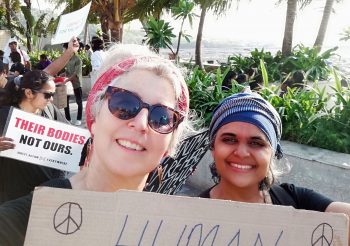
Jeeva Bhavana, part of the JIVINITI Coalition, is a vegan environmental NGO in India co-founded by Julie Wayne, Madhavi Kolte, and Sanjeev Naik. Based on ahimsa, the nonprofit believes that a healthy India is possible only when animals are no longer enslaved, exploited, and slaughtered. Its mission stems from the premise that animal agriculture is the main contributor to global warming, environmental devastation, public health crises, diminishing food security, equal access to healthy food, and growing precarity of farmers. It assists farmers in their transition to ethical and natural plant-based agriculture to create a sovereign and sustainable food system, and farmers are well compensated for the work that they do. Jeeva Bhavana also conducts conferences, health camps, workshops and film screenings to share health and environmental benefits of adopting a whole-food plant-based diet. Recently, Jeeva Bhavana and JIVINITI published a joint Position Statement on the on-going farmers protests in India. Find on Facebook and Instagram.

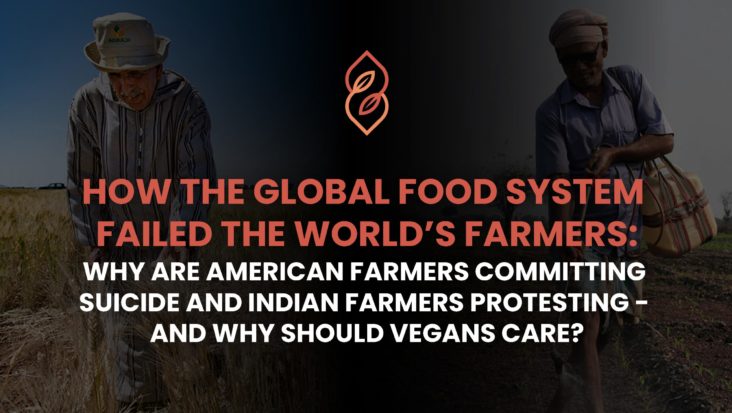
Thank you for this oft neglected aspect of agriculture. Taking note of the human angle will, I hope, garner more support for the global movement towards a more sustainable and compassionate lifestyle.